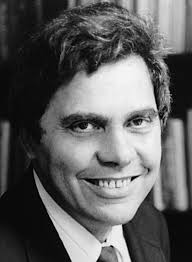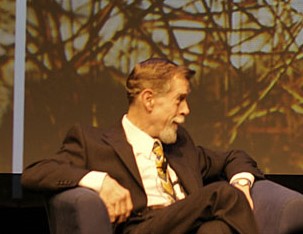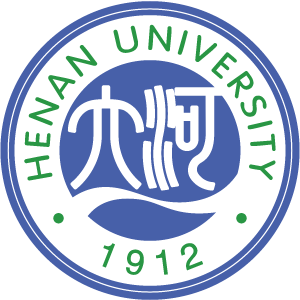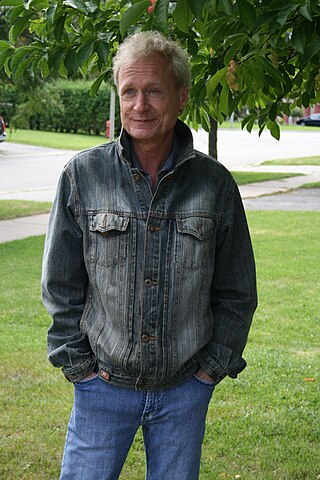
Herbert Marshall McLuhan was a Canadian philosopher whose work is among the cornerstones of the study of media theory. He studied at the University of Manitoba and the University of Cambridge. He began his teaching career as a professor of English at several universities in the United States and Canada before moving to the University of Toronto in 1946, where he remained for the rest of his life. He is known as the "father of media studies".

Harold Adams Innis was a Canadian professor of political economy at the University of Toronto and the author of seminal works on media, communication theory, and Canadian economic history. He helped develop the staples thesis, which holds that Canada's culture, political history, and economy have been decisively influenced by the exploitation and export of a series of "staples" such as fur, fish, lumber, wheat, mined metals, and coal. The staple thesis dominated economic history in Canada from the 1930s to 1960s, and continues to be a fundamental part of the Canadian political economic tradition.
Media ecology theory is the study of media, technology, and communication and how they affect human environments. The theoretical concepts were proposed by Marshall McLuhan in 1964, while the term media ecology was first formally introduced by Neil Postman in 1968.

Neil Postman was an American author, educator, media theorist and cultural critic, who eschewed digital technology, including personal computers, mobile devices, and cruise control in cars, and was critical of uses of technology, such as personal computers in school. He is best known for twenty books regarding technology and education, including Amusing Ourselves to Death (1985), Conscientious Objections (1988), Technopoly: The Surrender of Culture to Technology (1992), The Disappearance of Childhood (1982) and The End of Education: Redefining the Value of School (1995).

Eric Marshall McLuhan was a communications theorist, son of Marshall McLuhan.

A sensorium (/sɛnˈsɔːrɪəm/) is the apparatus of an organism's perception considered as a whole. It is the "seat of sensation" where it experiences, perceives and interprets the environments within which it lives. The term originally entered English from the Late Latin in the mid-17th century, from the stem sens- ("sense"). In earlier use it referred, in a broader sense, to the brain as the mind's organ. In medical, psychological, and physiological discourse it has come to refer to the total character of the unique and changing sensory environments perceived by individuals. These include the sensation, perception, and interpretation of information about the world around us by using faculties of the mind such as senses, phenomenal and psychological perception, cognition, and intelligence.

Walter Jackson Ong was an American Jesuit priest, professor of English literature, cultural and religious historian, and philosopher. His major interest was in exploring how the transition from orality to literacy influenced culture and changed human consciousness. In 1978 he served as elected president of the Modern Language Association.

Henan University is a provincial public university in Zhengzhou and Kaifeng, Henan, China. It is affiliated with the Province of Henan and co-funded with the Ministry of Education. The university is part of the Double First-Class Construction.
Robert K. Logan, originally trained as a physicist, is a media ecologist.

Bruce William Powe, commonly known as B. W. Powe, is a Canadian poet, novelist, essayist, philosopher, and teacher.
Edmund "Ted" Snow Carpenter was an American anthropologist best known for his work on tribal art and visual media.
Brenda Dervin (1938–2022) was a professor of communication at Ohio State University, working in the fields communication and library and information science. Her research about information seeking and information use led to the development of the sense-making methodology.

Marshall McLuhan's tetrad of media effects uses a tetrad - a four-part construct - to examine the effects on society of any technology/medium by dividing its effects into four categories and displaying them simultaneously. The tetrad first appeared in print in articles by McLuhan in the journals Technology and Culture (1975) and et cetera (1977). It first appeared in book form in his posthumously-published works Laws of Media (1988) and The Global Village (1989).
Global village describes the phenomenon of the entire world becoming more interconnected as the result of the propagation of media technologies throughout the world. The term was coined by Canadian media theorist Marshall McLuhan in his books The Gutenberg Galaxy: The Making of Typographic Man (1962) and Understanding Media (1964). Literary scholar Sue-Im Lee describes how the term global village has come to designate “the dominant term for expressing a global coexistence altered by transnational commerce, migration, and culture”. Economic journalist Thomas Friedman's definition of the global village as a world “tied together into a single globalized marketplace and village” is another contemporary understanding of the term.
John M. Culkin, Jr. was an American academic and former priest who was a leading media scholar and critic, educator, writer and consultant.
Ray L. Birdwhistell was an American anthropologist who founded kinesics as a field of inquiry and research. Birdwhistell coined the term kinesics, meaning "facial expression, gestures, posture and gait, and visible arm and body movements". He estimated that "no more than 30 to 35 percent of the social meaning of a conversation or an interaction is carried by the words." Stated more broadly, he argued that "words are not the only containers of social knowledge." He proposed other technical terms, including kineme, and many others less frequently used today. Birdwhistell had at least as much impact on the study of language and social interaction generally as just nonverbal communication because he was interested in the study of communication more broadly than is often recognized. Birdwhistell understood body movements to be culturally patterned rather than universal. His students were required to read widely, sources not only in communication but also anthropology and linguistics. "Birdwhistell himself was deeply disappointed that his general communicative interests and goals were not appropriately understood." Collaborations with others, including initially Margaret Mead and Gregory Bateson, and later, Erving Goffman and Dell Hymes had huge influence on his work. For example, the book he is best known for, Kinesics and Context, "would not have appeared if it had not been envisaged by Erving Goffman" and he explicitly stated "the paramount and sustaining influence upon my work has been that of anthropological linguistics", a tradition most directly represented at the University of Pennsylvania by Hymes.
This is a bibliography of Marshall McLuhan's works.
Jussi Ville Tuomas Parikka is a Finnish new media theorist and Professor in Digital Aesthetics and Culture at Aarhus University, Denmark. He is also (visiting) Professor in Technological Culture & Aesthetics at Winchester School of Art as well as Visiting Professor at FAMU at the Academy of Performing Arts in Prague. In Finland, he is Docent of digital culture theory at the University of Turku. Until May 2011 Parikka was the Director of the Cultures of the Digital Economy (CoDE) research institute at Anglia Ruskin University and the founding Co-Director of the Anglia Research Centre for Digital Culture. With Ryan Bishop, he also founded the Archaeologies of Media and Technology research unit.
The Toronto School is a school of thought in communication theory and literary criticism, the principles of which were developed chiefly by scholars at the University of Toronto. It is characterized by exploration of Ancient Greek literature and the theoretical view that communication systems create psychological and social states. The school originated from the works of Eric A. Havelock and Harold Innis in the 1930s, and grew to prominence with the contributions of Edmund Snow Carpenter, Northrop Frye and Marshall McLuhan.
Adeena Karasick is a Canadian poet, performance artist, and essayist. Born in Winnipeg of Russian Jewish heritage, she is the distinguished author of 13 books of poetry and poetic theory, as well as a series of parodic videopoems, such as the ironic "I Got a Crush on Osama" that was featured on Fox News and screened at film festivals, Ceci n'est pas un Téléphone or Hooked on Telephonics: A Pata-philophonemic Investigation of the Telephone created for The Media Ecology Association, "Lingual Ladies" a post-modern parody of Beyoncé's "Single Ladies", and "This is Your Final Nitrous" a poetic response to the Burning Man Festival., and White Abbot, a parodic videopoem Karasick created during the writing of Salome: Woman of Valor, dedicated to the impossible anguish of forbidden love.









